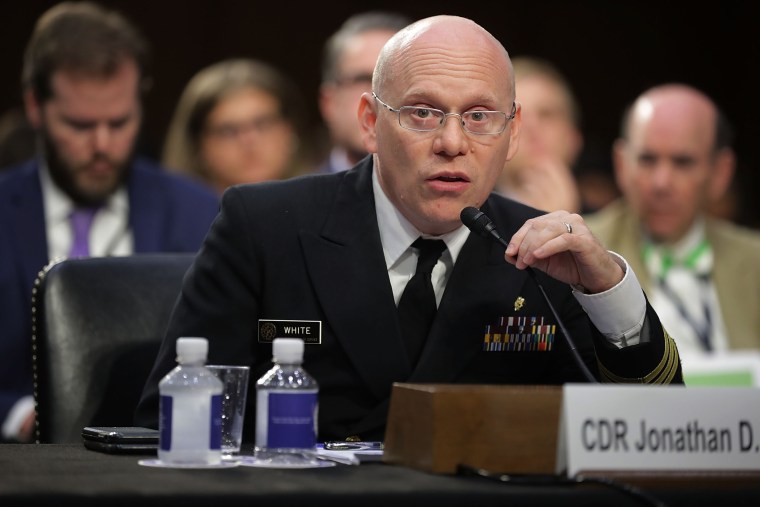A top health official in the Trump administration told a House subcommittee that the agency tasked with caring for unaccompanied migrant children would never "have supported" family separations at the border.
“Neither I nor any career person in [the Office of Refugee Resettlement] would ever have supported such a policy proposal,” Cmdr. Jonathan White said at the hearing Thursday.
The hearing comes as newly-empowered House Democrats seek to increase investigations into the family separations in the wake of the 2018 midterm elections.
The testimony also comes after an inspector general report found "thousands" more children may have been separated from their parents than previously reported.
"I really think that what we’re talking about is state-sponsored child abuse, and I would go as far as to say kidnapping of children," Rep. Jan Schakowsky, D-Ill., said during the hearing.
White, who leads the efforts by the Department of Health and Human Services to reunite migrant children with their families, told representatives he first heard of the possibility of family separations at a meeting in February 2017. He said he sought to raise concerns over the harm that it could cause children.
“On the occasions that I raised it, I was advised that there was no policy that would result in the separation of children and parents, and that remained the answer that I received during my entire tenure until I left [the Office of Refugee Resettlement],” White, who is now in another office within the HHS, said.
White also said he voiced concerns to his immediate leadership that family separations were occurring “based on what we were seeing” before President Donald Trump’s administration officially announced its “zero tolerance” policy in the spring of 2018.
He said he had no personal knowledge of anyone at the HHS "being advised of zero tolerance policy prior to its public announcement."
The Office of Refugee Resettlement is tasked with the care of unaccompanied migrant children. While the majority of children in its care arrive in the United States alone, the agency also houses children who were separated from their parents.
White has previously testified that he and others warned the administration of the negative consequences of family separations.
HHS Secretary Alex Azar declined to testify before the committee.
The government had identified more than 2,700 children who were separated under the policy since a federal court ordered the administration to reunify them with their families in June. But, it’s estimated that many more may have been separated since the summer of 2017, according a report by the HHS inspector general.
An inspector general’s official told the House subcommittee of estimates that the department received and released thousands of separated children to sponsors prior to the court order.
White said that once children are sent to sponsors, they are no longer under the authority of the Refugee Resettlement Office. Most children released to sponsors are sent to live with parents and immediate family or in rarer cases extended family or family friends, he said.
The Trump administration said in a court filing last week that reuniting the children separated before that order may not be “within the realm of the possible."
Lee Gelernt, the American Civil Liberties Union’s lead attorney in the family separations case, has called that response “shocking.”
During the hearing Thursday, Gelernt called on the government to “find out the full scope of the problem.”
He also called for a database going forward to allow for the quick tracking of family separation cases.
Immigration advocates and medical professionals have said that such separations lead to lasting trauma and irreparable harm to the children.



